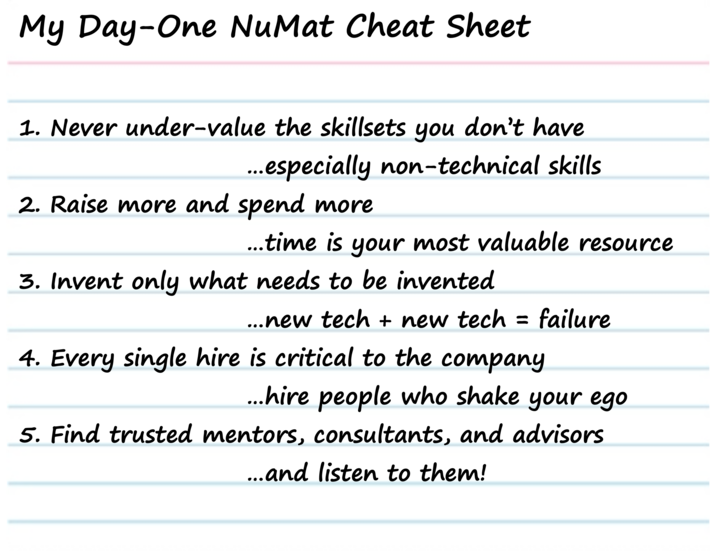I’m lucky to have been invited by Freshwater Advisors to give a talk to the AWS Clean Energy Accelerator. The event was comprised of entrepreneurs and venture investors looking to advance their scientific innovations. They were a truly impressive group.
I was asked to give a talk about the lessons learned in scaling a “deep tech” company. I really enjoyed building a response to the prompt. I decided to do away with the everything-is-great veneer us startups often portray and instead tell real stories about the early days of the company. No one talks about working toward billion-dollar ideas on shoestring budgets, especially in industries where safety concerns mean you can’t move fast and break things. A $2m seed round felt like all the money in the world when we started but it was far too small to sustain a scientific business.
I finished up the story by offering advice generated through a slightly unusual prompt. Rather than offering generic guidance, I instead continued the tone of the presentation and focused on where I felt like NuMat mis-stepped early on. If I could send a single index card to myself in 2012, here’s what I’d send. 💬And yes, the back of this card is just the word BITCOIN in thick sharpie.

This is a highly personal list of lessons I learned the hard way through Seed and Series A, but I hope that sharing my stumbling blocks may help others out there.
First, and the biggest – never undervalue the skillsets you don’t have. Our day-one team was an MBA, a chemical engineer, and a chemist. Personality wise, we were all similar – risk-tolerant inventors aka the type of people who find themselves at seed-stage startups. What was NOT at the table were the many linear thinkers needed to make a company run. A company needs accountants, lawyers, IT, manufacturing, dozens of compliances, and more. A deep tech company further needs scientists and engineers of different disciplines all understanding and respecting each other’s crafts. These are not skill sets you should skimp on. Just like a good founder can make or break a company, a good Safety officer has that same influence. Although it’s talked about far less.
Second, you’re going to need more money. Whatever estimate a seed or series A deep tech company comes up with is too low, likely because they’re only budgeting for the skillsets they have and understand. For example, I’ve never seen a seed pitch where a company budgets for its information security compliance. Furthermore, capital-lite companies often focus on non-dilutive government funding; these are wonderful in moderation but can silently take company control away from you if overused.
Third, invent what only needs to be invented. As a group of inventors, we invented not only around our tech but everything else. We’re excited by new technologies and love learning about them. However, aiming to go to market with multiple high-risk technologies drives your technical likelihood of success to near zero. The best beachhead technologies learn how to fit within existing supply chains, becoming drop-in replacements for other parts - often at the cost of performance. At NuMat, we call this “the brass ring”. Rather than going for gold, work until you have a good-enough drop-in replacement. Once you prove a market, there will be space for future product generations.
Fourth, the importance of hiring. This is a platitude everyone says, no one explains what it means, and few do right. It’s an entire topic in of itself but I like to think of it as “hire people who shake your ego”. Hire people who are better than you, to the point where they threaten to take your job. Check your ego and don’t get in their way. In fact, encourage them to take your role. At a startup, you can be constantly giving away your legos and still somehow always be busy. To do this right, you need to get onto learning about management and culture ASAP. I’ve found At The Table with Patrick Lencioni to be great for bike rides to work, First Round Review to be the perfect accompaniment to a morning coffee, and The Guerilla Guide to Interviewing to be the ideal refresher before you step into an interview.
And fifth, build a trusted network of advisors in everything. Entrepreneurship, chemical engineering, intellectual property, compliance, sales… literally everything. University alumni networks are great for this. Some advisors may be expensive, but a single sentence from the right advisor can save you from months of figuring it out yourself.
My time travel index card has a big flaw – it’s expensive! How do you do all of these things as a young founder struggling to get early investors? How do you survive needing dozens of skillsets but only being able to afford a small team? This leads me to a short story I’ll leave you with that, in my mind, best explains what building a deep tech startup feels like.

This is NuMat’s flaming modem.
When we moved out of working in cafes and into our first lab, we needed internet. Someone brought in a home router, plugged it in, and we all had wifi. Problem solved, and no one thought again about it. On to the next problem.
Fast forward a couple of years. Three people was now over a dozen, and we had all sorts of lab equipment, servers, and other devices needing internet. Our internet got spottier over time, but no one really cared. It wasn’t the priority. One day, it came to a head. On a day where the internet wasn’t working, I noticed a small wisp of smoke coming from one of our back office tables. I went to look and traced the smoke back to our poor overworked modem.
I needed internet, so I read a couple of articles and bought something fancier. This in turn lasted a couple of years, until once again we were too big and needed something more industrial.
The lesson I took from this: startups are about ruthless prioritization. An ounce of prevention may be less than a pound of cure, but you can’t afford an ounce today and you may be out of business tomorrow. With that constant short-term pressure, expect to be spending many pounds on curing. Put your resources toward your biggest problems and save everything else for another day.
For all new capabilities your company needs, start with seeing how much you can do alone. Prove it out. As you scale, hire consultants to support. If, at some point, your new domain is so on fire that it’s top of the company priority list, hire the right person and hand it off. Repeat this over and over and you’ll build an impactful team, where every team member is effectively managing their own fire.
Enjoy the ride.